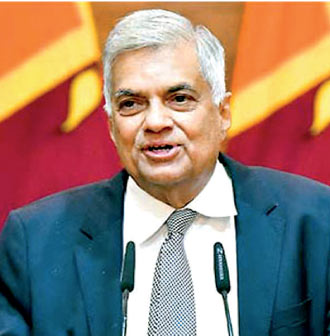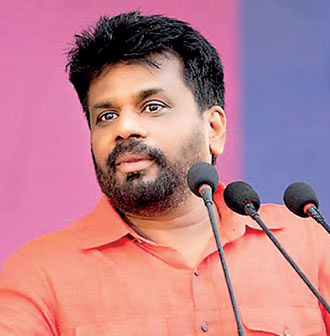Sunday Feb 15, 2026
Sunday Feb 15, 2026
Monday, 18 December 2023 00:03 - - {{hitsCtrl.values.hits}}

President Ranil Wickremesinghe

NPP Leader Anura Kumara Dissanayake

SJB Leader Sajith Premadasa
|
I know there is no straight road. No straight road in this world. Only a giant labyrinth of intersecting crossroads
– Federico Garcia Lorc –
 ‘People never believe in volcanoes until the lava overtakes them.’ The phrase of wisdom occurred to me, when I listened to President Ranil Wickremesinghe sermonising in Parliament, that there is no other way other than the path he had decided to plod on.
‘People never believe in volcanoes until the lava overtakes them.’ The phrase of wisdom occurred to me, when I listened to President Ranil Wickremesinghe sermonising in Parliament, that there is no other way other than the path he had decided to plod on.
Later in the day, the path he had decided to take was revealed in all splendours.
Legislation for revising VAT was enacted by a blatantly contemptuous, patently heavy-handed process of parliamentary manoeuvring. No serious discussion preceded its adoption.
This revised VAT scheme will not raise the required revenue. It will bring unspeakable misery to ordinary people. It is a devise to take a land of hungry, angry people to a chaotic hell of bewildering price hikes in a hand cart.
Come January we will begin to see how this satanic circus will unfold.
The principal opposition party the SJB is confounding matters. Its principal economic spokesman adopted a lofty posture. He agreed that the President and Finance Minister was in the right direction. His complaint was that the people pushing the President’s hand cart weren’t reliable and possibly, were heading in another direction!
The SJB must make up its mind. Hungry and angry people have no patience or breathing space for academic sophistry.
This convoluted logic of moral markets that eschew greed will not take the SJB anywhere any soon in the coming year when both presidential and parliamentary elections are expected.
Ordinary people, plainly shattered by their inability to feed and educate their young, burdened by the frightening thought that their elderly will not receive needed medical care will not be appeased by punditry on social market economics.
The NPP no doubt has a clear edge. But their studied silence on how they will deal with the IMF is decidedly deceptive. We are at a point when trust in Government is non-existent.
AKD projects himself as fighter campaigner for honest politics. Sajith claims a legacy – son of a former President – A proven performer of the good old UNP.
The NPP is attuned to the rhythm of the people’s heartbeat.
They downplay the role of technocrats as decision makers. The SJB wants to do two things. They wish to make their leader President. They also promise to introduce a social market economy.
Economics is not a science as physics. This difference is immediately relevant to what’s being discussed by the learned, not so learned and the vast majority who happen to live puzzled and foxed by the antics of those who claim mastery of economics.
It is time we understand that economics is only a discipline attempting to make sense out of a messy world. We cannot expect clean answers.
It is time for both AKD and Sajith to come to terms with what’s at stake. In human history there has never been an ideology that always pleased all.
As Thomas Piketty points out in his classic work ‘Capital and Ideology’ ideological conflict and disagreement are inherent in the very notion of ideology.
‘Ideology at any given time is a set of plausible ideas describing how a society should be structured at a particular time in history.’
We are at a crossroad. We must emerge from bankruptcy. In doing so we must address inequality.
As Piketty points out, “Inequality is neither economic nor technological. It is ideological and political.”
How the market should operate, how fierce or how benign competition should be, who has acquired so much merit to reach a tax haven, are all decided by “we the people.” Not by cronies, special advisors, and Chiefs of Staff.
It is the people who should decide the conceptual definitions of these mumbo jumbo terms.
The coming battle has two clear sides – ‘People’ and the ‘Power Elite’
Ordinary people or most of them have a rough idea about the money power that controls money, banking and finance.
If you follow social media, you will learn about young people who with tantalising eloquence disembowel the murky innards of the power elite.
People know what went wrong in the past 75 years. The internet and the World Wide Web have made young people better informed than ever before.
They communicate with one another directly, bypassing intermediaries who in earlier times could control and limit what people can share.
The UNP-SLPP combine is an aberration. UNP is near extinct. The SLPP as was demonstrated at its last ‘hurrah’ at the Sugathdasa stadium is a rotting cadaver.
We live in dystopian times. The ruling elite are oblivious to evil. In the coming year with elections due we can see some beauty in this dystopia.
Things are so warped, so horrifying, it allows us to dream of a different world. We still have the power to change our world.
In 2024 the tide will turn. People are determined to empower themselves. People are determined to fight until they can assert themselves to install and ignite a new political order that is more fair, more humane, and more peaceful. They will strive to select new leaders who will act more responsibly in accordance with the will of the people.
|
The purpose of this missive is to appeal to both Anura Kumara Dissanayake and Sajith Premadasa to call a truce to bring about the changes desired by ordinary people in political innovation and restructuring.
A market economy is necessary. Not a market society. As Karl Polanyi insists in his ‘Great Transformation’ the most seminal work in political economy written in the 20th century ‘a self-adjusting market is stark Utopia.”
“Such an institution could not exist for any length of time without annihilating the human and natural substance of society; it would have physically destroyed man and transformed his surrounding into a wilderness.”
The Bond Deals of which we have heard so much, the pump and dump deals that still need exposure are symptoms of a market society.
A Market system is necessary. Capitalism has no alternative in the horizon. There are no easy solutions. The purpose of the state is to keep constant vigil on a fine balance between personal gain and societal wellbeing.
When society is subordinated to an unchecked market system a counter reaction – a societal counter reaction precipitates a crisis.
When social wellbeing is utterly, and totally undermined and social counterforce is driven to a corner a crisis is unavoidable.
Resulting chaos created in this double movement can lead to ‘more brutal forms being adopted by the kakistocracy in command to solve the economic crisis.
Anura Kumara Dissanayake should be familiar with the writings of Antonio Gramsci – Marxist philosopher who died in one of Mussolini’s jails. Gramsci says, “Common sense is a chaotic aggregate of disparate conceptions, and one can find anything that one likes.”
The SJB and the NPP are vying for power. Both share a predicament. What do they represent?
Are they the voice of discontent?
Are they the voice of the future?
Is it too much to ask for a single voice?
This is an age-old dilemma faced by nations mismanaged and misruled. Philosopher Karl Poper addressed it.
“The question is not how to get good people to rule; the question is how to stop the powerful from doing as much damage as they can to us.”